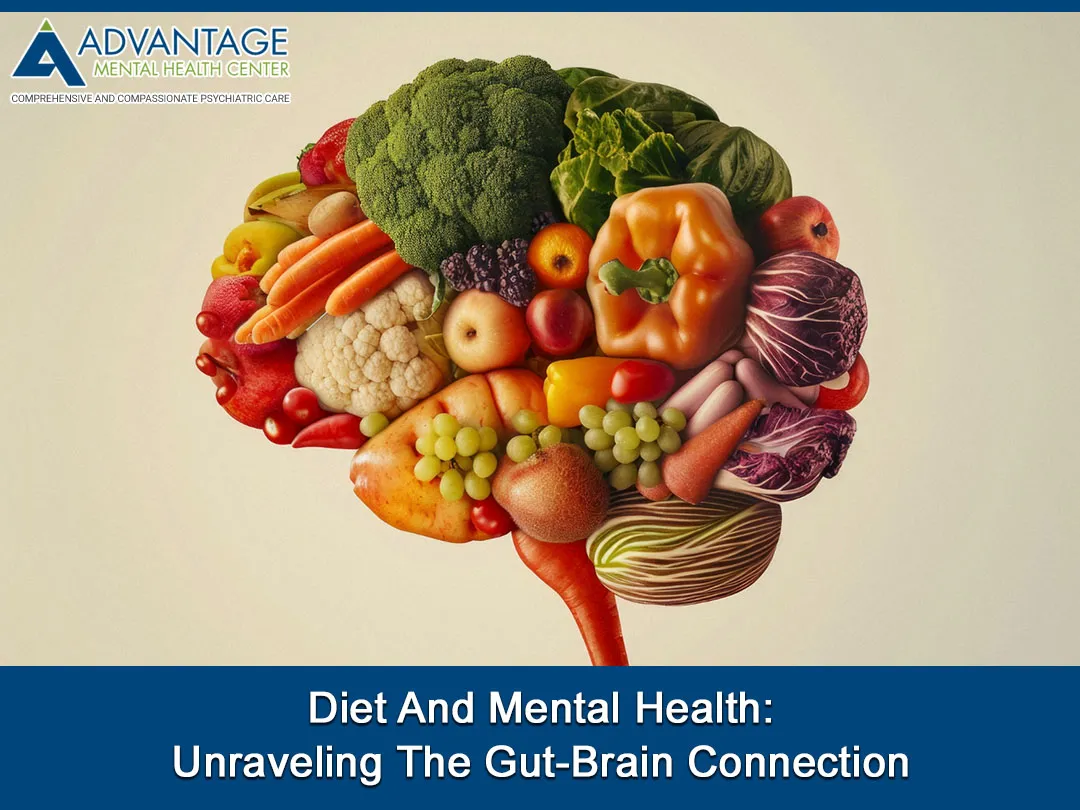Introduction
The intricate relationship between diet and mental health has been a subject of increasing interest in the field of nutrition, psychology, and psychiatry. Psychiatrists and other mental health professionals are recognizing how what we eat can significantly influence our mental well-being, affecting mood, cognitive function, and even the risk of developing mental health conditions.
Understanding the Connection
Diet and Mood
The intricate relationship between diet and mood is increasingly recognized as a critical aspect of mental health. Numerous studies have shown that poor nutrition is frequently linked with negative mood states, such as low mood or depression. This connection is primarily due to the fact that a diet lacking essential nutrients can lead to deficiencies with far-reaching impacts on mental health.
Essential Nutrients and Mental Health
One of the key aspects of this relationship is the role of essential nutrients, such as vitamins, minerals, and Omega-3 fatty acids. These nutrients are vital for brain health and function. For instance, B vitamins, particularly B12, and folate, are crucial for neurotransmitter production and nerve function. A deficiency in these vitamins can lead to mood disturbances. Similarly, Omega-3 fatty acids, found in fish oils, have anti-inflammatory properties and are essential for brain cell membrane health. Low levels of Omega-3 fatty acids have been associated with a higher risk of mood disorders, including depression and anxiety.
Gut-Brain Axis
Another significant aspect of the diet-mood connection is the gut-brain axis. This refers to the bidirectional communication system between the gastrointestinal tract and the brain. The gut microbiota, which comprises trillions of bacteria and other microorganisms, plays a pivotal role in this communication. A balanced and diverse gut microbiota is believed to positively influence brain function, partly through the production of neurotransmitters like serotonin, which is primarily produced in the gut. On the other hand, an imbalanced gut microbiota can contribute to mood disturbances. A diet rich in prebiotics (found in foods like garlic, onions, and asparagus) and probiotics (found in fermented foods like yogurt and kimchi) can support a healthy gut microbiome, subsequently promoting better mental health.
Inflammatory Foods
Impact of Inflammatory Foods
Conversely, certain dietary choices can have a negative impact on mental health. Inflammatory foods, particularly those high in refined sugars and unhealthy fats, can exacerbate mental health issues. These foods contribute to systemic inflammation, which is a known risk factor for many chronic diseases, including mental health conditions. The inflammation can extend to the brain, potentially worsening symptoms of mental health conditions such as depression and anxiety. For instance, high sugar intake has been linked to increased symptoms of depression, while trans fats found in many processed foods can worsen anxiety.
Nutritional Strategies for Mental Health
Balanced Diet
Eating a balanced diet rich in fruits, vegetables, whole grains, lean protein, and healthy fats is crucial. These foods provide essential nutrients that support brain health, including B vitamins, vitamin D, Omega-3 fatty acids, and antioxidants.
Omega-3 Fatty Acids
Omega-3 fatty acids, found in fatty fish, flaxseeds, and walnuts, are particularly important for brain health. They play a role in brain cell structure and function and are linked to a lower risk of mood disorders.
Probiotics and Prebiotics
Foods rich in probiotics (like yogurt and kefir) and prebiotics (like garlic, onions, and bananas) can promote a healthy gut microbiome, which is beneficial for mental health due to the gut-brain axis.
Avoiding Processed Foods
Limiting processed foods, which are often high in sugars, unhealthy fats, and additives, can help reduce inflammation and support overall brain health.
Diet and Specific Mental Health Conditions
Depression
There’s evidence suggesting that a Mediterranean diet, which is high in fruits, vegetables, fish, and olive oil, can help reduce the symptoms of depression. This diet is anti-inflammatory and rich in nutrients critical for brain function.
Anxiety
For anxiety, a diet low in processed foods and sugars and high in Omega-3 fatty acids, vitamins, and minerals can be beneficial. These nutrients help regulate stress hormones and support brain health.
Cognitive Function
A diet rich in antioxidants, vitamins, and Omega-3 fatty acids can enhance cognitive function and may help prevent cognitive decline with aging.
Integrative Approach
While diet is a crucial factor in mental health, it is essential to approach mental well-being holistically. Psychiatrists and other mental health professionals often emphasize the importance of combining good nutrition with other lifestyle factors like exercise, adequate sleep, stress management, and, when necessary, professional psychological help.
Conclusion
The emerging evidence underscores the significant impact of diet on mental health. Adopting a nutritious diet can be a powerful tool in enhancing mental well-being, managing symptoms of mental health conditions, and improving overall quality of life. For those in the Tampa Bay area seeking professional support alongside nutritional guidance, Advantage Mental Health Center provides comprehensive care. Their team of experts understands the complex interplay between diet and mental health, offering tailored treatment plans that incorporate nutritional strategies. Embracing a holistic approach, Advantage Mental Health Center is dedicated to providing relief and promoting wellness in the community.
Picture Credit: Freepik


